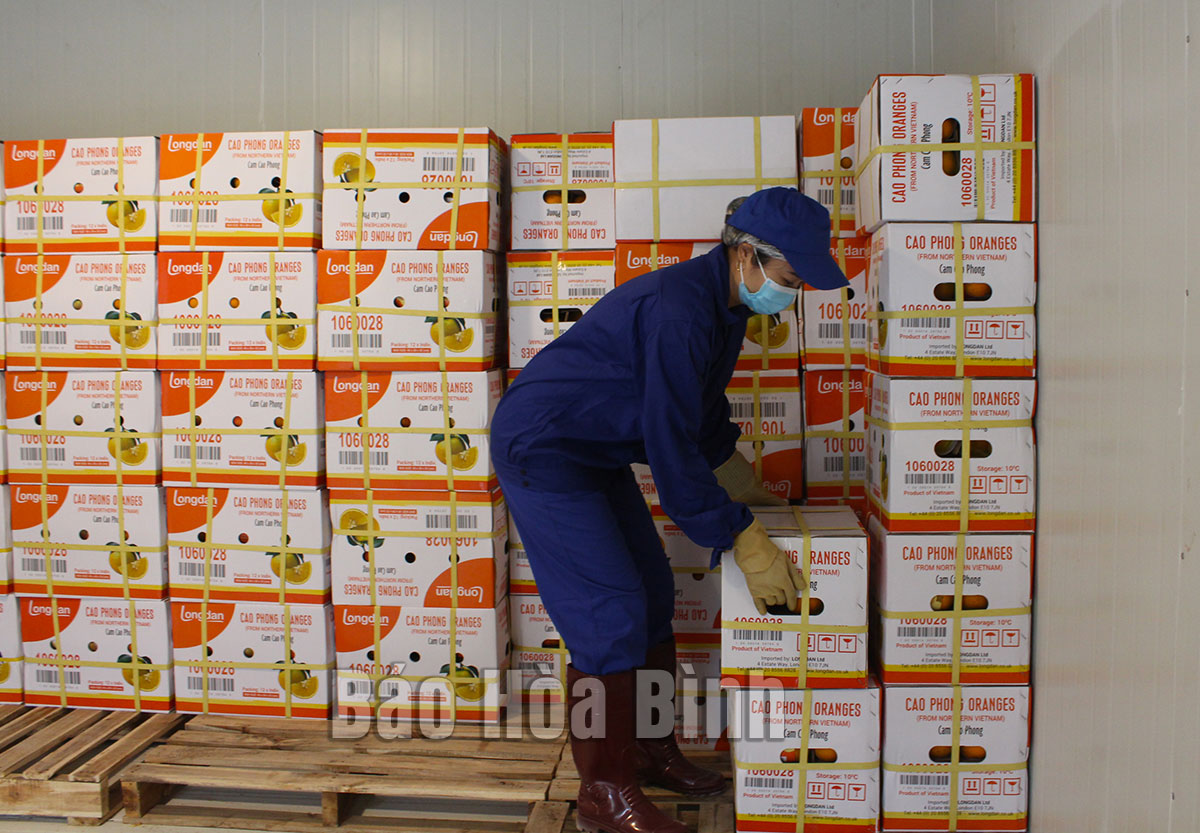
(HBO) – Looking back at the first quarter of 2023, it can be seen that the Executive Committee of the Cao Phong district Party Organisation and the Standing Board of its Party Committee focused on directing the drastic implementation of political tasks, while the local socio-economic situation was basically stable and posted growth over the same period last year. Such favourable development will help Cao Phong complete its goals set for 2023, emphasised Ha Van Di, Secretary of the district Party Committee.
In the first quarter, Cao Phong district achieved important results with the export of local oranges to the UK market. Photo: Workers at Cao Phong Co., Ltd. transport the batch of oranges for export.
According to the orientation of the local Party Committee, 2023 is the year of reviewing and evaluating the mid-term outcomes of implementing the Resolution issued by the 28th Congress of the district’s Party Organisation and a five-year socio-economic development plan for 2021-2025.
Among its key solutions, the district prioritises mobilising resources for economic recovery and development, particularly the improvement of the local business climate and the effective and drastic implementation of its new-style rural building programme.
Statistics show that in the first three months of this year, Cao Phong welcomed about 125,000 tourists and earned some 70 billion VND (2.98 million USD) in tourism revenue, up 14.84% year-on-year.
Ha Van Di, Secretary of the district Party Committee, said to drive tourism development, Cao Phong has concertedly deployed solutions, prioritising investment in infrastructure building and investment attraction. It houses a number of State-funded projects costing over 400 billion VND, and eight non-state budget projects worth more than 800 billion VND. Prominent among them are resort tourism projects in the two communes of Binh Thanh and Thung Nai, which promise to create a breakthrough for the local tourism development.
Towards the goal of becoming a new-style rural district by 2025, the district has so far recorded seven out of its nine communes meeting the criteria. Its industry - handicraft production and trade – service have maintained good results, while its implementation of national target programmes has been on schedule. Social security, defence-security, and social order have also been guaranteed./.
The Standing Board of the Hoa Binh provincial Party Committee has agreed in principle on a proposal by the Standing Board of the Party Committee of Hoa Binh city to gather feedback on the city’s 1:2000 zoning plan, which forms part of its broader urban development strategy.
Hoa Binh province has made notable progress in public administration reform and digital government development, with the satisfaction index among citizens and businesses reaching over 84%, according to recent government evaluations.
Thanks to great efforts by local authorities in recent times, the governance and public administration performance of Mai Chau district has been significantly improved.
In the afternoon of June 6, the Party Committee, the People's Council, the People's Committee and the Fatherland Front of Lac Son district solemnly held a meeting to celebrate the 139th anniversary of the district's founding (1886–2025) and the 79th anniversary of the establishment of the district's Party Committee (1946–2025). There was the attendance of Mr. Bui Van Thang, the Vice Chairman of the Provincial People's Council; Mr. Quach Tat Liem, the Vice Chairman of the Provincial People's Committee; Ms. Dang Bich Ngoc, the Deputy Head of the National Assembly Delegation of the province; as well as the former leaders of the province and district through various periods, who are the natives of the district.
Implementing the Politburo’s Resolution No. 57-NQ/TW on breakthroughs in science – technology, innovation, and digital transformation is a golden opportunity for the northern mountainous province of Hoa Binh to renew growth model, improve competitive edge and shorten digital gap.
Resolution 57-NQ/TW, issued by the Politburo on December 22, 2024, identifies sci-tech, innovation, and digital transformation as strategic breakthroughs to build a developed and prosperous nation. In Hoa Binh province, this spirit is not just a slogan, it’s being put into action through concrete initiatives that form a "new development triangle”: digital citizenship, digital economy, and digital administration.



